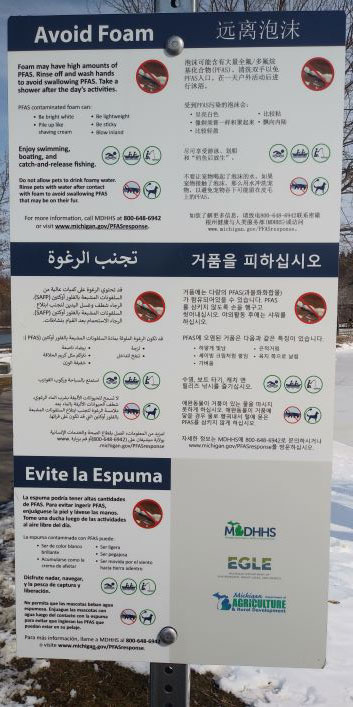PFAS warnings touch our everyday lives
As we see more and more signs, literally, of PFAS contamination in our everydays lives, Environment Michigan will continue to work to protect our families from these chemicals.

I was running along the Border to Border trail the other day, and as I ran through Gallup Park in Ann Arbor I saw a new sign. The sign posted by the Gallup Park playscape warns people about the PFAS contamination in the Huron River that runs through the park, and tells people to avoid the foam.
PFAS, or Per/Polyfluoroalkyl Substances, are a family of up to 5000 different compounds. We’ve used a number of them broadly in things like fire fighting foam, non-stick cookware, water proofing fabric, and even in things like some fast food wrappers and waterproof cosmetics. PFAS contamination is widespread across the state because of their broad range of uses.
We know some of these are dangerous at very small levels, where they can act as an endocrine disruptor. They’re linked to health effects like cancer, thyroid problems, kidney disease, and high cholesterol.
For those of you following the issue, you might have read about the contamination in the Huron River with at least one source of contamination as far upstream as Wixom. As a result of the contamination, no one should eat any fish in the Huron from Wixom to Lake Erie. Now we’re being warned to avoid the foam where PFAS concentrates.
Michigan’s MPART website lists sites of known ground water contamination, and as of March 16, 2020, there are 87 PFAS sites in Michigan. It’s sad to think that this might be the new normal; where our day to day lives need warning signs about contamination that endangers our health.
We’re working hard to push Michigan to be more protective of our families. I testified at a public meeting on behalf of Environment Michigan members on the emergency rules for seven types of PFAS. Those rules should go into effect in a couple months, but they’re only a first step. We will continue to push for lower, health based limits, regulating PFAS as a class, and getting them out of consumer products like dental floss, sunscreen, and mascara.
Nathan
State Director, Environment Michigan

